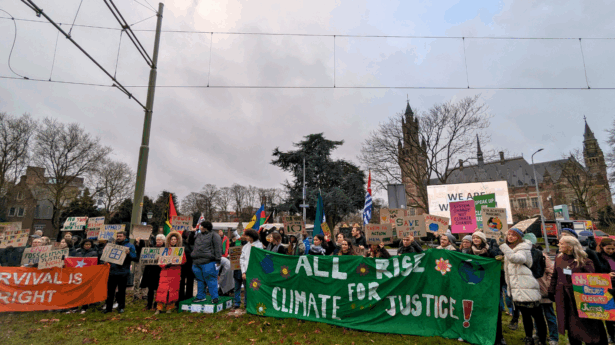The Unitarian Universalist Service Committee advances human rights through grassroots collaborations.
The Human Pain and Suffering of Water Shutoffs

April 7, 2016
Alice Jennings on water affordability
More than a year ago, UUSC brought together a group of experts, activists, and people affected by the Detroit water shutoffs to share the realities of what was happening with key members of Congress. In the “Trouble on Tap” hearing, attorney Alice Jennings shared what she had learned as one of the lead attorneys of the Lyda Pro Bono Lawyers Committee, which helped 10 Detroit families bring a civil and human rights lawsuit against Detroit for shutting off their water. As the issues raised in that hearing persist today, Jennings and other human-right-to-water leaders in Detroit and around the country have together launched the National Coalition for Legislation on Water Affordability (NCLAWater).
Michigan lawyers Marilyn Mullane and Lorray Brown had worked since 2005 on affordability in Detroit with Michigan Welfare Rights Organization’s Maureen Taylor and Highland Park Human Rights Coalition’s Marian Kramer. Also in 2005, the People’s Water Board — a coalition made up of more than 30 organizational partners — was formed with leadership from Lila Cabbil and Charity Hicks (the latter now deceased). The national effort benefited from the Detroit expertise and leadership. Taylor and Jennings called the country to Detroit to stop the mass water shutoffs in that city in 2015. The idea to develop national legislation came out of that gathering of social movements in Detroit as Jennings and Mullane proposed drafting national legislation. UUSC, our partner the Environmental Justice Coalition on Water, and the NAACP Legal Education Defense Fund worked with the Detroit leadership to found NCLAWater (affordablewaternow.org).
As NCLAWater launches an exciting and extensive campaign for national legislation on water affordability — one of the keys aspects of the human right to water — revisit some of Jennings’s vital testimony from last year’s congressional briefing.
Excerpts from 2015 congressional briefing statement
“Detroit, Michigan, is experiencing a humanitarian and public health crisis. Since January 1, 2013 over fifty-three (53,000) thousand Detroiters, residential customers of Detroit Water and Sewerage Department (DWSD), had their water and sewerage abruptly terminated. . . . I cannot advise you of the exact numbers of Detroit children, disabled, elderly or others at risk Detroiters living in houses without water, though we know almost 15,000 homes were not restored to service. No analytical tool, study or review was created by state or local government prior to the shutoffs, or at any time to capture the data on the social demographic of the inhabitants in the shutoff homes.”
* * *
“What we know . . . is that human pain and suffering has occurred and continues to occur in Detroit, because of the water and sewerage shutoffs and the non-sustainability of the DWSD service increases and ‘payment plans’, which are not based on affordability. Not having water service immediately makes a home uninhabitable under Detroit ordinances. Children under State law can be immediately taken from their parents or family and placed under protective services. Fear, humiliation and embarrassment are not uncommon where water has been shut off for non-payment.”
* * *
“A mother of three, Nicole Hill, one of the Plaintiffs in the Lyda case, with an Eight Thousand ($8,000) Dollar water bill, sent her children to stay with relatives after the water was shutoff to her residential home. Mom stayed in the house. The little girl, age 7, got up in the middle of the night and decided she wanted her mother. Determined, she left her Aunt’s home and walked out into Detroit streets at 2:00 a.m. An angel, a Good Samaritan saw the little girl and called the police. After talking to the child at 3:00 a.m., the police delivered the child to her mother. Crying, the child stated, ‘Mommy don’t make me leave you again!’ Ms. Hill was hospitalized with a severe viral infection for over a week after her water was cut off for a second time, again without notice. Ms. Hill’s water bill is inconsistent with bills ranging from $27.00 to $689.00 in the last eight month period. Ms. Hill has received water bills during the timeframe when her water service was terminated.”
* * *
“Carol Ann Bogden testified on September 22, 2014 that she is a senior citizen, age 67, living alone on Social Security Disability. At the time of the hearing on September 22, 2014, her water service remained disconnected, from its shutoff date of July 11, 2014.
“Ms. Bogden got behind in her own bills attempting to help a disabled adult son with major medical conditions. Ms. Bogden testified she would heat water from bottles on the stove to attempt to bathe herself and to live without running water.
“The day of the shutoff Ms. Bogden reports a blue line was painted in front of her home. ‘I was really embarrassed. I started to cry. I thought that was done and over with back in the Second World War’.
“Ms. Bogden, though she had 10% to pay on her $1,006.00 bill, was not allowed to enter a payment plan because she did not have a current identification. Her purse had recently been stolen. DWSD refused to accept other forms of identification and at the time of the hearing in October 2014 would not allow her to enter a payment plan in person or by phone.
“To get help on her $1,000.00 plus bill Ms. Bogden contacted THAW, United Way, Salvation Army, and Department of Human Services, none of the organizations had funds to assist her. Ms. Bogden indicated even if she was allowed to pay $90.00 a month on her overdue bill ‘it’s going to be very hard’, because it has nothing to do with her current bills.”

